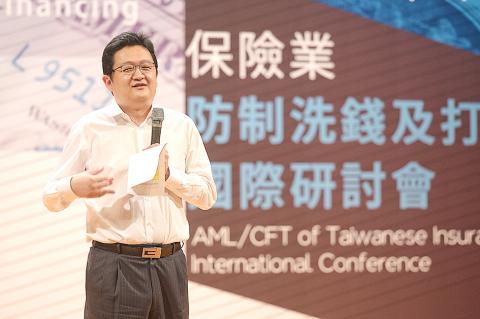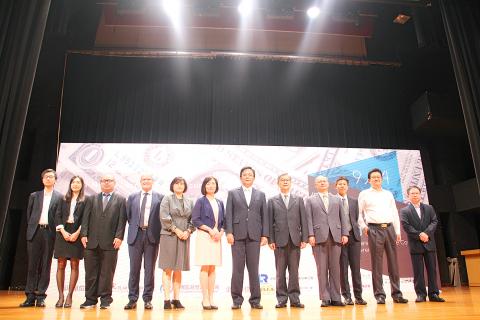Government regulators and international experts provided guidance and training for Taiwan’s insurance industry on compliance in the global effort to combat money laundering and financial crimes at a conference organized by the Insurance Anti-Fraud Institute (IAFI, 保險犯罪防制中心) on Friday last week in Taipei.
The goal of the conference was to prepare for Taiwan’s third-round mutual evaluation by the Asia/Pacific Group on Money Laundering (APG) in November, which is to assess the country’s performance and key indices on preventing predicate crimes related to international money laundering and terrorism financing.
Hundreds of professionals from Taiwan’s insurance industry participated in the event, titled the “Anti-Money Laundering (AML) and Counter Terrorism Financing (CTF) of Taiwanese Insurance Companies International Conference.”

Photo: Chang Chia-ming, Taipei Times
Besides IAFI as the main organizer, the event also received sponsorship and technical advice from the Financial Supervisory Commission (FSC, 金融監督管理委員會) and the Anti-Money Laundering Office of the Executive Yuan (行政院洗錢防制辦公室).
Delegates from professional groups against money laundering from Macau and Taiwan’s financial regulators made presentations on their experience of APG evaluation and fighting the flow of laundered “dirty money” and other predicate crimes.
They were joined by Kenneth Pemberton, a senior official at Standard Chartered Bank of Hong Kong.

Photo: Wu Cheng-feng, Taipei Times
Deputy Minister of Justice Tsai Pi-chung (蔡碧仲), who is also the director of Anti-Money Laundering Office, said in the opening address that the government had implemented new measures, working closely with the private sector, to prepare for the APG evaluation.
“Together we have put much effort and resources into Taiwan’s compliance to combat money laundering and terrorism financing,” Tsai said. “It is important to discuss and interact with these invited experts for our insurance companies to keep current on international trends and prepare for the APG evaluation.”
FSC Vice Chairman Huang Tien-mu (黃天牧) said Macau had done very well in the 2017 APG Evaluation Report, receiving a good passing grade, which has been difficult to achieve for most other jurisdictions in Asia, and therefore Taiwan can draw on the territory’s experience and expertise.
“But there are significant differences, as our insurance industry is much larger in scope, as Taiwan is ranked 10th-largest in the world in terms of its insurance market. We also have much more variety and a wider range of insurance products than Macau,” Huang said.
IAFI Chairman Shaw Jy-juinn (邵之雋) said earnest efforts are needed by those in the insurance industry to integrate laws against money laundering and fraud into their companies’ business practices, which can give them and edge.
“Taiwan’s industries must follow these laws and implement measures to attain a good APG result, because we need to pass the evaluation, so that Taiwan can participate in the global financial markets, conduct international trade and continue to attract foreign investment,” Shaw said.
FSC Insurance Bureau (保險局) Deputy Director Ko Ying-tao (葛映濤) said that the nation’s insurance industry can be divided into five main categories: life insurance; non-life insurance; reinsurance; insurance brokerages; and insurance agents.
As is the case with banks, insurance firms are at risk of money laundering and financial fraud through the purchase of insurance products, policies covering real-estate assets and false insurance claims terrorists finance when engaging in their business, Ko said.
He urged companies to employ customer due diligence to verify policyholders’ identities, as well as enhanced due diligence, ongoing due diligence, proper record-keeping of client data and suspicious transactions reports to facilitate their works related to AML/CFT.
Liu Yuming (劉宇明), vice chairman for the Association of Certified Anti-Money Laundering Specialists Macau Chapter, presented a report on Macau’s preparations for and response to its APG onsite evaluation last year and how Taiwan can learn from the experience.
In the APG evaluation, Macau obtained 37 “compliant” and “largely compliant” ratings out of the 40 categories stipulated by the Financial Action Task Force, but the important assessments were on 11 key indicators, known as “immediate outcomes,” Liu said, adding that Taiwan should focus on those.
The outcomes include assessing risks from money laundering and terrorism financing; scope of international cooperation; the standard of regulation bodies; preventive measures; functioning of the legal framework; financial intelligence; the investigation and prosecution of money laundering; the confiscation of illicit proceeds; and the investigation and prosecution of terrorist financing offenses.
Macau Anti-Money Laundering Specialists Association (澳門反洗錢師專業協會) senior official Li Feixue (李飛雪) said that since joining APG in 2001, Macau has established an inter-departmental Anti-Money Laundering Working Group consisting of representatives from 15 government agencies, including the finance ministry, police force, justice ministry, judicial investigators and financial regulators.
An important program of the working group began in 2013, when it launched a survey of all financial entities to produce an overall risk assessment for Macau, which Li said was a huge undertaking, because the territory faces inherent risks presented by the casinos and gaming concessions within its jurisdiction, which also includes gaming intermediary professionals and their associated occupations, such as accountants, lawyers and real-estate agents.
The wide adoption of “know-your-customer” facial recognition technology by Macau banks for automated teller machines have reduced money laundering and financial crimes, Li said. It has been effective to monitor the money flow and transactions by non-residents, as many visitors to Macau come from China or Hong Kong to visit casinos and participate in gaming.
Another preventive measure was a recent legal amendment to require the reporting of remittances exceeding 8,000 Macau patacas (US$990) at casinos and gaming concessions, Li said.
FSC section chief for international affairs Wang Hsiang-heng (王湘衡) said that Taiwan has convened four major meetings on the APG evaluation since June last year, producing the National Risk Assessment Report to identify the areas that needed the most work and which presented the highest risk of money laundering.
The report listed eight high-risk areas for Taiwan: drug trafficking; telecoms fraud; smuggling; tax evasion; organized crime; insider trading and financial securities crimes; corruption by public officials; and third-party money laundering, which includes transactions arranged by lawyers and accountants, as well as foreign currency transfers by underground banks and black-market dealers.
Much of the criminal proceeds from money laundering that enters Taiwan comes from China, Hong Kong or Macau, along with Vietnam and the Philippines, while the outflow is to the same five jurisdictions, plus Indonesia and Malaysia, Wang said.
Pemberton, regional head of intelligence for Greater China and North Asia for Standard Chartered Bank, pegged the total amount of money laundered globally in 2016, the latest year for which statistics were available, at US$2 trillion.
“We have found that money laundering is everywhere and no financial sector is immune to it, and that includes the insurance business,” Pemberton said. “The authorities are constantly fighting against it, but the methods are constantly changing and we are barely able to keep up with it.”
Pemberton said that data analytics should be used to fight financial crime and identify money laundering through insurance products using warning signs such as insurance purchases inconsistent with clients’ source of wealth, clients providing minimal or fictitious information, overpayment of premiums with a subsequent refund to a third party, early cancelation of a policy purchase and repeated or unexplained changes in beneficiary.
Working with public-private partnerships is an important aspect to fighting financial crime, Pemberton said, citing Hong Kong as an example, where law enforcement agencies have set up the Fraud and Anti-Money Laundering Intelligence Taskforce, a joint working group that includes the police, financial regulators and Hong Kong’s 10 major banks.
The task force has a “strategic group” at the top, which meets twice yearly to provide overall direction and set priorities for the second-tier “operations group,” which in turn has monthly meetings to share intelligence on suspicious activity reports about individuals or companies.
The third level is the “alerts function,” which meets one or twice a week to disseminate intelligence on likely financial crimes to banks and regulators; initiate investigations into “red flag” cases; and draft alert reports to share with all banks in the territory through the Hong Kong Monetary Authority and the Hong Kong Association of Banks.
The Life Insurance Association of Taiwan (人壽保險商業同業公會) was one of the co-organizers of the conference, along with the Non-Life Insurance Association of Taiwan (產物保險商業同業公會), the Professional Insurance Brokers Association (保險經紀人商業同業公會) and the Insurance Agency Association (保險代理人商業同業公會).

CAUTIOUS RECOVERY: While the manufacturing sector returned to growth amid the US-China trade truce, firms remain wary as uncertainty clouds the outlook, the CIER said The local manufacturing sector returned to expansion last month, as the official purchasing managers’ index (PMI) rose 2.1 points to 51.0, driven by a temporary easing in US-China trade tensions, the Chung-Hua Institution for Economic Research (CIER, 中華經濟研究院) said yesterday. The PMI gauges the health of the manufacturing industry, with readings above 50 indicating expansion and those below 50 signaling contraction. “Firms are not as pessimistic as they were in April, but they remain far from optimistic,” CIER president Lien Hsien-ming (連賢明) said at a news conference. The full impact of US tariff decisions is unlikely to become clear until later this month

With an approval rating of just two percent, Peruvian President Dina Boluarte might be the world’s most unpopular leader, according to pollsters. Protests greeted her rise to power 29 months ago, and have marked her entire term — joined by assorted scandals, investigations, controversies and a surge in gang violence. The 63-year-old is the target of a dozen probes, including for her alleged failure to declare gifts of luxury jewels and watches, a scandal inevitably dubbed “Rolexgate.” She is also under the microscope for a two-week undeclared absence for nose surgery — which she insists was medical, not cosmetic — and is

GROWING CONCERN: Some senior Trump administration officials opposed the UAE expansion over fears that another TSMC project could jeopardize its US investment Taiwan Semiconductor Manufacturing Co (TSMC, 台積電) is evaluating building an advanced production facility in the United Arab Emirates (UAE) and has discussed the possibility with officials in US President Donald Trump’s administration, people familiar with the matter said, in a potentially major bet on the Middle East that would only come to fruition with Washington’s approval. The company has had multiple meetings in the past few months with US Special Envoy to the Middle East Steve Witkoff and officials from MGX, an influential investment vehicle overseen by the UAE president’s brother, the people said. The conversations are a continuation of talks that

Alchip Technologies Ltd (世芯), an application-specific integrated circuit (ASIC) designer specializing in artificial-intelligence (AI) chips, yesterday said that small-volume production of 3-nanometer (nm) chips for a key customer is on track to start by the end of this year, dismissing speculation about delays in producing advanced chips. As Alchip is transitioning from 7-nanometer and 5-nanometer process technology to 3 nanometers, investors and shareholders have been closely monitoring whether the company is navigating through such transition smoothly. “We are proceeding well in [building] this generation [of chips]. It appears to me that no revision will be required. We have achieved success in designing